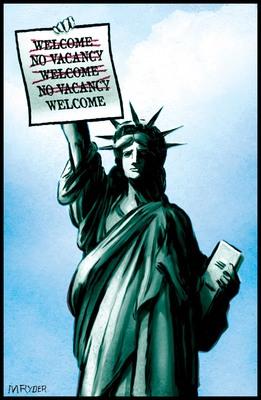- MENU
- HOME
- SEARCH
- WORLD
- MAIN
- AFRICA
- ASIA
- BALKANS
- EUROPE
- LATIN AMERICA
- MIDDLE EAST
- United Kingdom
- United States
- Argentina
- Australia
- Austria
- Benelux
- Brazil
- Canada
- China
- France
- Germany
- Greece
- Hungary
- India
- Indonesia
- Ireland
- Israel
- Italy
- Japan
- Korea
- Mexico
- New Zealand
- Pakistan
- Philippines
- Poland
- Russia
- South Africa
- Spain
- Taiwan
- Turkey
- USA
- BUSINESS
- WEALTH
- STOCKS
- TECH
- HEALTH
- LIFESTYLE
- ENTERTAINMENT
- SPORTS
- RSS
- iHaveNet.com
Nikki Schwab and Paul Bedard

It has been delayed twice and is flying in under the healthcare debate, but the president and a select group of lawmakers are finally talking immigration reform at the White House.
The key players last time around were Senators Ted Kennedy and John McCain. Kennedy continues to battle brain cancer, but McCain will be among the lawmakers at the meeting. "Yes, he was invited, and yes, he will be attending," McCain Communications Director Brooke Buchanan tells Whispers. But as far as the senator taking a high-profile leadership role, she stays mum. "We'll leave it at that for now," she says.
Vigils are being held today in Arizona, including outside McCain's Tucson, Arizona, office, to push for immigration reform this year.
Chatter on what immigration reform will look like is picking up in Washington, too. One idea, being shopped around to congressional staffers and reporters yesterday, would be to create a guest-worker program of sorts.
Called the "red-card solution," it would have foreign workers head to employment agencies in their home countries to be matched with American employers and issued a noncitizen work permit, a red, temporary ID card that would allow them to stay and work legally in the United States for as long as they held that specific job. Then they would return home.
"I think that's a humane, easy thing to do," says Helen Krieble, the founder and president of the Vernon K. Krieble Foundation, who came up with the idea. A businesswoman herself, Krieble was looking for a way to fill lower-paying jobs at her Colorado equestrian center and found herself in the dilemma of not being able to find Americans for the work and not being able to employ foreign workers legally either.
"The antibusiness idea that business people are out to rape the workforce does not appeal to me," she says, reiterating that she could not find Americans to do these jobs.
This plan would provide a legal means to work temporarily in the United States but would not help the 12 million illegal immigrants already living here.
But just what Congress will actually approve -- or even consider -- is an open question.
Few Democrats or Republicans in the Senate are signaling that immigration legislation is guaranteed to receive a vote before the end of the year. Senate Majority Leader Harry Reid, noting that it will be considered only after energy and healthcare reform, still gave it a nod. "Being third on the list is pretty good," he shrugged. He did say that the "votes are there" to pass it, however.
Republicans eager to show Hispanics that they care are also pushing for reform, based on the past packages that were rejected during President Bush's second term. Clearly concerned that no package can emerge that starts in Congress, the GOP is urging President Obama to come up with his own plan.
"Unless the president comes up with a plan, there not much of a chance," said Sen. John Cornyn, the No. 3 Republican leader. "We know what the options are," added Cornyn, who has previously authored immigration reform legislation.
In a likely reference to the immigration summit, Cornyn warned the president against just talking about immigration reform.
"What we need now is not another photo op," he said. Cornyn also hit the White House for sliding the timing back on beginning immigration reform.